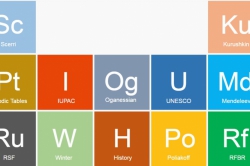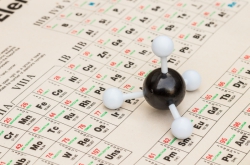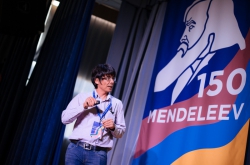The periodic table is a tabular arrangement of the chemical elements, ordered by their atomic number, electron configuration, and recurring chemical properties, whose structure shows periodic trends.
63 chemical elements were known by the middle of the XIX century, and many scientists attempted to come up with some kind of system. In 1869, Dmitri Mendeleev formulated the Periodic Law and published his table of chemical elements, which was the predecessor of the modern periodic table. The first table consisted of 67 elements. In subsequent years, Mendeleev repeatedly modified it and added new elements.

150 years of the periodic table: international symposiums, competitions and the 4th International Conference on the Periodic Table
2019 will be the 150th anniversary of the periodic table and has therefore been proclaimed the “International Year of the Periodic Table of Chemical Elements” (IYPT 2019) by the UN. All around the globe celebrations will take place in 2019. The purpose of IYPT is to enhance the understanding and appreciation of fundamental science among the public. On June 1, IUPAC (International Union of Pure and Applied Chemistry) and UNESCO launched a website devoted to the International Year of the Periodic Table, where you can find an overview of events around the world.
On February 8, the Russian Science Day and Dmitri Mendeleev’s Birthday, Moscow will host the Opening Ceremony for the International Year of the Periodic Table, while on July 26-28, St. Petersburg will host the 4th International Conference on the Periodic Table at ITMO University.
Why St. Petersburg?
It was Mikhail Kurushkin, a lecturer at ITMO’s Research and Educational Center of Chemical Engineering and Biotechnology, who initiated the idea to host the Conference in March 2018 when talking to Eric Scerri, a professor of chemistry at the University of California, Los Angeles.

“I have been studying the periodic table for about ten years. It’s about this time when I first read Eric Scerri’s publications. Eric Scerri is one of the leading scientists in the field of chemistry, a writer and philosopher of science. Last year, I published my first article on the periodic table in the Journal of Chemical Education. I sent this article to Eric Scerri, and we started communicating. In December, he told me about the UN announcing 2019 the International Year of the Periodic Table and we decided to contribute to the celebration of this event”, shares Mikhail Kurushkin.
Only three conferences on the periodic table have been organized so far. The first one was held in 1969 in the Vatican, while the second and the third ones were held in 2003 and in 2012 in Canada and Peru, respectively. It was here, in St. Petersburg, where Dmitri Mendeleev published his first version of the periodic table. That’s why St. Petersburg was chosen as the host city for the Conference, notes Mikhail Kurushkin.

A website of the Conference has already been launched. Among the people who have already joined the event are many Russian and international researchers, e.g. Fabienne Meyers, a member of the IUPAC secretariat and IUPAC Chemistry International journal’s editor. The event has already gained support from Russia’s leading universities. Conference proceedings will be published by Oxford University Press.
Key topics and speakers
The Conference will be held for three days. Among the speakers are both scientists and specialists working in the field of chemistry.
“The periodic table is an icon of science, not just chemistry. That’s why we decided to invite speakers from various fields and countries. There will be scientists from the US and Italy, and from other Russian cities”, says Mikhail Kurushkin.

Among the scientists who received invitations to speak at the Conference will be Yuri Oganessian, a Soviet and Russian nuclear physicist, a researcher at the Flerov Laboratory of Nuclear Reactions at the Joint Institute for Nuclear Research and the only currently living person with a chemical element named after him, George Whitesides, a prolific author with the highest Hirsch index of all living chemists, and Jean-Marie Lehn, a Nobel Prize winner in chemistry.

“Does the periodic table have an end? There is no unambiguous opinion about it yet, but there are many theories. This is a very interesting question, which is still relevant today. Besides, scientists still argue about the very concept of the table”, commented Mikhail Kurushkin.
Target audience
During the three days, ITMO University will host various exhibitions, workshops and poster sessions. The winners will get an opportunity to receive Eric Scerri’s books and presents from the Conference’s partners.
“We’re going to invite some speakers, who have never presented their research in Russia before. I’m proud that this event will take place at ITMO University”, says Mr. Kurushkin.




